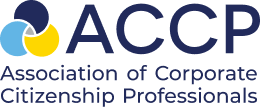2023
In 2023, ACCP continued to grow despite a challenging economic environment reaching an all-time high of 250+ member companies. The ACCP Annual Conference, taking place in Denver, Colorado, also continued its growth trajectory, selling out at 375 attendees. These milestones highlighted the increasing significance of our collective mission and showcased the growing excitement surrounding all that ACCP offers. ACCP’s thought leadership, emphasizing the critical role of CSR and ESG in driving overall business success garnered attention from prominent media outlets, including Bloomberg, Forbes, and Nasdaq Tech.
2022
In 2022, ACCP adopted a 3-to-5-year strategic plan to guide the organization’s future. The plan was created after more than a year of input from the ACCP community, including member interviews, focus groups, and substantial work by our Board of Directors. The strategic plan features updated statements about our mission, vision, and values as we work to advance the corporate social impact field through knowledge sharing, fostering solutions, cultivating inclusive peer communities, and advocating for the profession. These focus areas will be woven into existing programs, and into new ones in the years to come.
2020
In a year where we addressed a global pandemic, a racial justice reckoning, economic downturn, and an increase in divisiveness, ACCP responded with a laser focus on our members’ growing needs. We transformed the ACCP Conference to a virtual program that included the same high-quality speakers and learning labs, as well as valuable networking opportunities. We redesigned our remaining 2020 programs to be delivered virtually, created COVID-19 and Racial Justice Resource Centers, partnered with peer organizations to streamline member meetings, and introduced virtual regional and industry groups where members could regularly connect and learn together. Through these actions, we were pleased to see our members work together to address the “next normal."
2019
ACCP membership and conference attendance jumps to highest numbers in organization history, with 213 member corporations and 267 attendees at The Conference 2019. ACCP launches new brand—and accompanying website—to better reflect the energy and vibrancy of the field.
2018
Membership surges to more than 200 member companies. ACCP responds with new programming and offerings including annual regional meetings in 12 cities, the launch of more robust digital offerings for members, including more frequent webcasts, and the publication of an industry body of knowledge, The Corporate Citizenship Guide: Defining the Profession.
In March 2018, ACCP hires Carolyn Berkowitz to serve as President and CEO.
2017
The organization changes its name from Association of Corporate Contributions Professionals to Association of Corporate Citizenship Professionals, signaling an intentional broadening of its focus—and the field. ACCP increases full-time staff to seven to better serve its growing membership.
2015
The 10th anniversary of Conference is celebrated with attendance topping out at nearly 240 attendees. ACCP publishes its first Benchmarking Survey.
2012
ACCP continues to grow its membership base and launches its first online community, allowing the network of purpose-driven professionals to connect with each other and learn from each other in a virtual space.
2007
Membership grows exponentially in the first two years, exceeding 100 within the first year of operating and expanding to 140 by 2007. With the growing membership base comes a need for professional staff, including a Director of Finance, Donna Kraemer and a Director of Member Services, Melinda Bostwick in 2006, and ACCP’s first President and CEO, Mark Shamley, in 2007.
2005
Following the success of the Academy, Weeden launches the first annual Conference on Contributions in Orlando with 40 companies attending.
Then, with six successful years of trainings complete, a group of 10 companies decide to start a 501(c)(6) in 2005. The organization—which launches with chartered bylaws, a 15-member Board, and 15 founding companies—decides to focus on corporate contributions, community relations, and employee volunteer management. The Association for Corporate Contributions Professionals states a three-fold mission: Professional Education, Management Resources, and Advocacy.
1999
Curt Weeden, former J & J Contributions executive, theorizes that changing expectations for high performance in the corporate social investment field required the standardization of business practices and a more strategic approach. To facilitate this, Weeden launches the Corporate Contributions Academy—known today as the Forum—with seven companies attending.
Over the next three years, more than 50 individuals will partake in the training.
